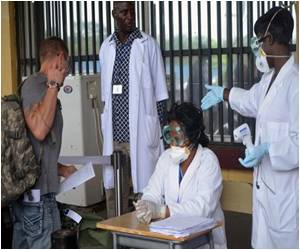Japanese researchers have developed a new test to detect the presence of the Ebola virus in 30 minutes.

"The new method is simpler than the current one and can be used in countries where expensive testing equipment is not available," Yasuda told AFP by telephone.
"We have yet to receive any questions or requests, but we are pleased to offer the system, which is ready to go," he said.
Yasuda said the team had developed what he called a "primer", which amplifies only those genes specific to the Ebola virus found in a blood sample or other bodily fluid.
Using existing techniques, ribonucleic acid (RNA) -- biological molecules used in the coding of genes -- is extracted from any viruses present in a blood sample.
This is then used to synthesise the viral DNA, which can be mixed with the primers and then heated to 60-65 degrees Celsius (140-149 Fahrenheit).
Advertisement
Currently, a method called polymerase chain reaction, or PCR, is widely used to detect the Ebola virus, which requires doctors to heat and cool samples repeatedly and takes up to two hours.
Advertisement
The outbreak of the Ebola virus, transmitted through contact with infected bodily fluids, has sparked alarm throughout western Africa and further afield.
Source-AFP











